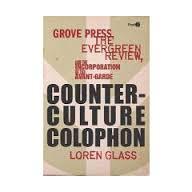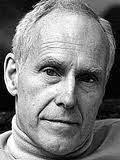 Today we are going to talk with Loren Glass, author of Counter-Culture Colophon: Grove Press, the Evergreen Review, and the Incorporation of the Avant-Garde. This book was recently released by Stanford University Press. Loren is a professor of English at the University of Iowa. His first book, Authors Inc.: Literary Celebrity in the Modern United States, was published by NYU Press in 2004. Publishers’ Weekly calls Counterculture Colophon “a richly evocative and incisive history.”
Today we are going to talk with Loren Glass, author of Counter-Culture Colophon: Grove Press, the Evergreen Review, and the Incorporation of the Avant-Garde. This book was recently released by Stanford University Press. Loren is a professor of English at the University of Iowa. His first book, Authors Inc.: Literary Celebrity in the Modern United States, was published by NYU Press in 2004. Publishers’ Weekly calls Counterculture Colophon “a richly evocative and incisive history.”
Andy: Loren, what’s so important about Grove Press? There are any number of great imprints in American book publishing. We all have heard of such publishers as: Random House, Alfred Knopf, and Farrar, Straus, and Giroux. Of course they have all been eaten up by multimedia conglomerates, but that’s another story. What makes Grove different and special?
Loren: Most people may have heard of those publishers, but not many readers select their book purchases based on that knowledge. When we go into a book store, we don’t ask the clerk if they have any Knopf Books or Random House books. What makes Grove different is that, for a time, an entire community of people, both in the United States and around the world, not only had heard of Grove but would buy books simply because they were published by Grove. By the mid-sixties, reading Grove Press books and the Evergreen Review came to signify being a member of the counterculture. Thus my title, Counterculture Colophon—a colophon being the visual symbol or insignia of the publisher, usually placed on the bottom of the spine of the book—is intended to indicate how Grove established both brand identity and brand loyalty to a degree that is very rare in the industry.
Andy: One of the things you write about in the book is how the success of Grove was linked to the growth of quality paperbacks and stores that specialized in these kinds of books. It was a phenomenon that really began in the mid-fifties. Can you explain this?
Loren: Yes, the so-called “quality paperback revolution” constituted the second stage of the paperback revolution, the inception of which is usually traced to 1939 with the beginning of Pocket Books. In the mid-fifties, starting with Anchor Books, publishers began publishing larger size paperbacks that focused on more literary titles (the format is now called trade paperback). These titles were especially successful in urban centers and college towns, and bookstores emerged, such as Cody’s Books and City Lights, that specialized in this format. Eventually, publishers began bypassing the hardcover stage entirely and issuing certain titles as “paperback originals.” Grove’s Evergreen Originals imprint was highly successful and influential, and included work by Samuel Beckett, Jack Kerouac, and Alain Robbe-Grillet.

Barney Rosset
Andy: Barney Rosset was the founder and key figure with Grove until he finally sold it in 1986. What kind of a guy was he? Was he passionate about literary publishing or did he just see a business opportunity?
Loren: Barney was passionate, impulsive, charismatic, and completely committed to Grove, which both he and others saw as an extension of his literary tastes which tended toward the avant-garde, and his political convictions, which tended toward the far left. As a result, his sensibilities felicitously overlapped with those of the emergent counterculture, which Grove grew in tandem with in the late fifties and early sixties. Sure, there were also the censorship trials that can be good publicity (particularly if you win), and Barney had some good business instincts, but neither he nor his co-workers saw Grove as a business. Actually, Barney sunk his entire fortune (which was considerable) into Grove Press. He died poor.
Andy: It always seemed to me that there was a kind of salacious side to Grove Press. Of course, as you said, there were the great literary modernists and the sixties new left theorists, but it seemed like the press was always fighting a battle around censorship. Why?
Loren: Barney’s strongest belief was in unfettered freedom of expression, regardless of content, and it is for his battle against censorship that he is most well-known, both in and outside the publishing industry. Barney despised censorship and he loved pornography, and this combination kept Grove mired in legal issues throughout the early sixties, and certainly contributed to their salacious image, especially in the later sixties, after Grove had effectively won the battle and Barney began publishing everything sexually explicit that he could get his hands on. It’s also worth noting that much experimental modernist work was also sexually explicit. This is, in fact, a longstanding connection dating all the way back to Flaubert and Baudelaire, both of whom were the subject of obscenity trials in 1857.
Andy: Grove also became involved in film in the late sixties. Why did it move in that direction and what were the consequences?
Loren: Barney had been interested in film since WWII, when he was in the Army Signal Corps in China, and after the war he produced a film called Strange Victory, about race relations in the US. Once Grove got on its feet as a publisher, he began looking into ways to get involved in film. He solicited a number of his authors to write scripts, one of which resulted in Beckett’s Film, which was made in the US, and produced and distributed by Grove. He also purchased Amos Vogel’s legendary Cinema 16. Most famously, though, Grove imported the Swedish film I am Curious, Yellow, which was an enormous success-de-scandale in 1969, and netted the company 14 million dollars, which Rosset promptly proceeded to invest in all sorts of foreign, experimental, and pornographic film. But he could never replicate the success of I Am Curious, and it’s clear that his investment in film was an economic drag on the company. Grove also brought out a number of illustrated film books which, I argue, were important in enabling the growth of cinema studies programs in advance of the rise of VHS and DVD technology.
Andy: Finally Grove was sold, improbably, to Lord George Weidenfeld and Ann Getty. This seems like an odd couple to carry on Rosset’s tradition. How did Grove change with them? What did Rosset think about it?
Loren: Barney was in debt and the company needed a cash infusion, and both Weidenfeld and Getty had access to essentially unlimited funds (I don’t know how their partnership arose). While they did try to maintain Grove’s avant-garde reputation, they didn’t want to deal with Barney, and one of the first decisions they made was to fire him. Not surprisingly, Rosset regretted his decision to sell.
Andy: The Grove name lives on today with the independent publisher, Grove-Atlantic. I have enormous respect for their publisher, Morgan Entrekin. But are they in any way carrying on the spirit of Grove? Is any publisher?
Loren: Not only is Entrekin committed to maintaining Grove’s avant-garde reputation, he also relies on Grove’s backlist of steady sellers, so to that degree he is carrying on the spirit. On the other hand, the publishing industry, as you noted, has been completely transformed by corporate consolidation and the larger cultural environment is entirely different from the sixties, so it’s not really possible to achieve what Grove did back then. This is partly because Grove was so successful, so that there isn’t really any risk in publishing sexually explicit material.
Andy: If Barney Rosset were starting out today in publishing, how would Grove Press be different?
Loren: Grove Press was a product of a very particular time and place. If Barney, or someone like him, were starting out today they would probably just be another small press on the margins of a massive culture industry run by a handful of large corporations.
